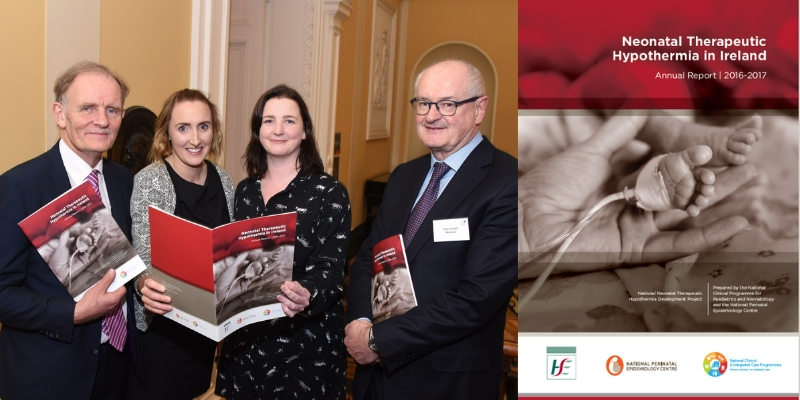Neonatal Therapeutic Hypothermia in Ireland, Annual Report 2016-2017

In November 2018, the Neonatal Therapeutic Hypothermia in Ireland, Annual Report 2016-2017 was launched. The findings of this audit illustrate the logistical challenges faced with the delivery of a high acuity, uncommon treatment that has to be delivered on short notice.
In November 2018, the Neonatal Therapeutic Hypothermia in Ireland, Annual Report 2016-2017 was launched. This report is a collaborative initiative between the National Clinical Programme for Paediatrics and Neonatology (NCPPN) and the National Perinatal Epidemiology Centre (NPEC) with support from the National Women and Infants Health Programme (NWIHP) and the Clinical Strategy and Programme Division of the Health Services Executive. From the outset a multi-disciplinary approach was taken which involved a national working group including relevant health professionals and specialists and patient advocates from across the health services. Representatives from the South/Southwest Hospital Group include Lucille Bradfield and Dr Peter Filan from Cork University Maternity Hospital.
Therapeutic Hypothermia (TH) is now the standard treatment for term infants (babies born after 36 completed weeks of gestation) with moderate to severe hypoxic-ischaemic encephalopathy (HIE). The consequences of HIE for the infant, their family and the wider society are considerable. Research has demonstrated TH reduces the rate of death, severe disability and lifelong cerebral palsy for infants born with moderate to severe HIE.
In Ireland, TH is administered in the four tertiary maternity hospitals, whereby infants born in other hospitals requiring this treatment are transferred to one of these four tertiary hospitals. Anonymised data were collected on site in the 19 maternity units/hospitals and neonatal intensive care units or special care baby units (NICU/SCBU) in the Republic of Ireland on all infants requiring TH between 1 January 2016 and 31 December 2017.
The report found that over the two year period, 140 infants required TH which suggests that one in 900 infants born in Ireland during 2016/2017 required TH. Nulliparous women accounted for 60% of the TH cohort (n=84). Of the women whose infants underwent TH, 18.6% (n=26) experienced maternal pyrexia during labour and 10% of women had a prolonged rupture of membranes (n=14). Less than 2% of mothers had an elective caesarean section. At one minute after birth 79.7%; of infants had an Apgar score between zero and three (n=110). Almost all infants required resuscitation at birth (95%; n=133 of 140), with 59.3% of infants needing intubation (n=83). Over the two year period, 60% (n=84) were born in a tertiary hospital with 40% (n=56) of infants requiring transfer from a regional or local hospital. The survival rate for the TH cohort was 88%, as 17 of the 140 infants died.
The findings of this audit illustrate the logistical challenges faced with the delivery of a high acuity, uncommon treatment that has to be delivered on short notice. These findings also highlighted that there was an overrepresentation of complications preceding and during the delivery of the infants requiring TH.
Department of Obstetrics and Gynaecology
An Roinn Obstatraice agus Gínéiceolaíochta
Contact us
Cork University Maternity Hospital, 5th Floor, Wilton, Cork, Ireland
